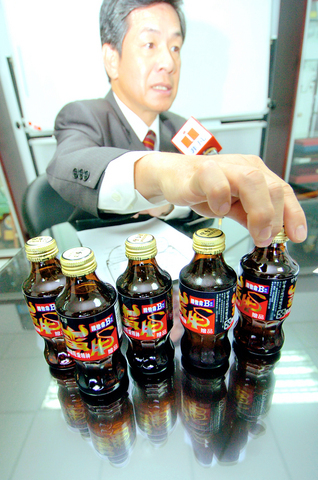Five people were poisoned after drinking energy drink Bullwild (
Taichung police said that hydride had been added to the beverages and that they are looking for suspects.
Hydride is an extremely poisonous chemical and a very small amount can cause death, according to police.

PHOTO: FANG PIN-CHAO, TAIPEI TIMES
Police said all Bullwild products, which are made by Paolyta Co, were immediately withdrawn from shops nationwide yesterday.
Police have so far found eight bottles containing poison. The caps on the tainted bottles had been replaced and all had stickers with the words "I am poisonous. Don't drink," stuck onto them, police said.
Additionally, police last night discovered one bottle of Paolyta B, another energy drink, with similar labeling.
Police said the perpetrators likely bought some Bullwild, added the hydride, then resealed the bottles with a new cap and surreptitiously placed them in convenience stores.
Police were not able to gather any fingerprints from the poisoned drinks.
The poisonings began surfacing on Tuesday.
Police said a 55 year-old man surnamed Chou on Tuesday night drank a bottle of Bullwild, and then immediately passed out.
That same night, a 58 year-old man surnamed Ker and a 33 year-old woman named Chao Shih-fang (趙世芳) shared a bottle of the drink. Ker spat out the liquid after drinking only a mouthful, as he said it tasted bad. Chao, however, drank more and passed out, police said.
The hospital said Ker would survive, but Chao would probably remain in a vegetative state.
In addition to these three cases, two more occurred yesterday.
Police said early in the morning a 30-year-old man surnamed Lee passed out after he drank a bottle of Bullwild.
Later in the day, a Taichung convenience store worker drank a mouthful of the beverage and became ill, police said.
The young man was sent to hospital for medical treatment. The hospital said he had been only slightly poisoned. Chou, Chao and Lee, however, are in critical condition, police said.
As part of their investigation, police yesterday visited three chemical shops in Taichung that sell hydride.
As a permit is needed to purchase the chemical, police are trying to identify whether the perpetrators attained hydride from those shops.
Additionally, after checking video surveillance monitors from the affected stores, police said they had identified a suspicious man in a white coat.
All the affected stores were located around the Taichung City government area.
Police are concerned that tainted Bullwild drink may still be available at small betel nut shops, which may not have withdrawn their stock.

Taiwan has received more than US$70 million in royalties as of the end of last year from developing the F-16V jet as countries worldwide purchase or upgrade to this popular model, government and military officials said on Saturday. Taiwan funded the development of the F-16V jet and ended up the sole investor as other countries withdrew from the program. Now the F-16V is increasingly popular and countries must pay Taiwan a percentage in royalties when they purchase new F-16V aircraft or upgrade older F-16 models. The next five years are expected to be the peak for these royalties, with Taiwan potentially earning

STAY IN YOUR LANE: As the US and Israel attack Iran, the ministry has warned China not to overstep by including Taiwanese citizens in its evacuation orders The Ministry of Foreign Affairs (MOFA) yesterday rebuked a statement by China’s embassy in Israel that it would evacuate Taiwanese holders of Chinese travel documents from Israel amid the latter’s escalating conflict with Iran. Tensions have risen across the Middle East in the wake of US and Israeli airstrikes on Iran beginning Saturday. China subsequently issued an evacuation notice for its citizens. In a news release, the Chinese embassy in Israel said holders of “Taiwan compatriot permits (台胞證)” issued to Taiwanese nationals by Chinese authorities for travel to China — could register for evacuation to Egypt. In Taipei, the ministry yesterday said Taiwan

Taiwan is awaiting official notification from the US regarding the status of the Agreement on Reciprocal Trade (ART) after the US Supreme Court ruled US President Donald Trump's global tariffs unconstitutional. Speaking to reporters before a legislative hearing today, Premier Cho Jung-tai (卓榮泰) said that Taiwan's negotiation team remains focused on ensuring that the bilateral trade deal remains intact despite the legal challenge to Trump's tariff policy. "The US has pledged to notify its trade partners once the subsequent administrative and legal processes are finalized, and that certainly includes Taiwan," Cho said when asked about opposition parties’ doubts that the ART was

If China chose to invade Taiwan tomorrow, it would only have to sever three undersea fiber-optic cable clusters to cause a data blackout, Jason Hsu (許毓仁), a senior fellow at the Hudson Institute and former Chinese Nationalist Party (KMT) legislator, told a US security panel yesterday. In a Taiwan contingency, cable disruption would be one of the earliest preinvasion actions and the signal that escalation had begun, he said, adding that Taiwan’s current cable repair capabilities are insufficient. The US-China Economic and Security Review Commission (USCC) yesterday held a hearing on US-China Competition Under the Sea, with Hsu speaking on